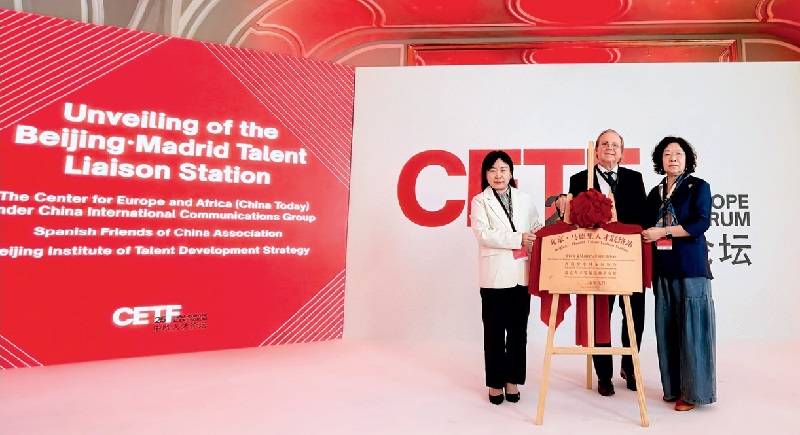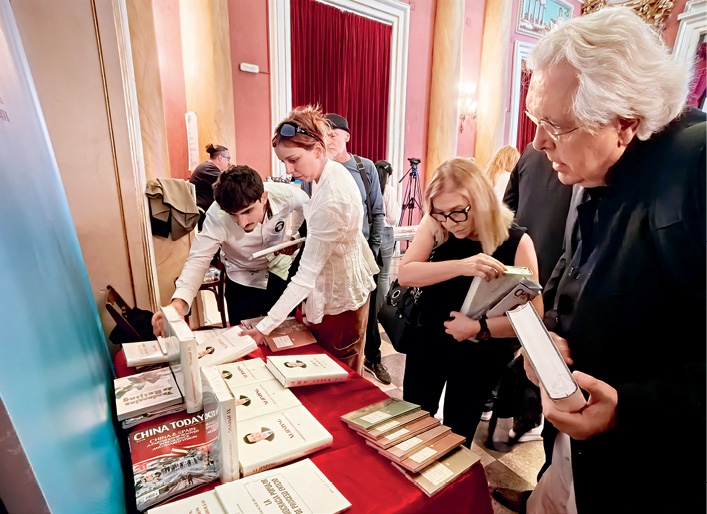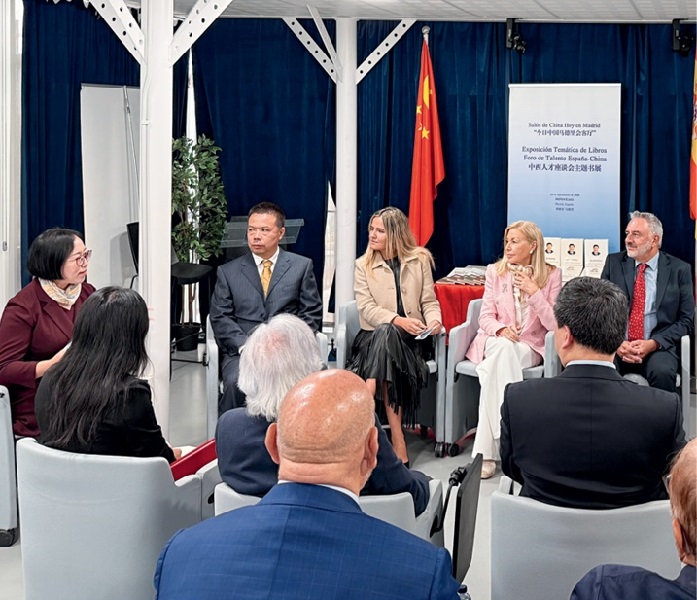
The Beijing·Madrid Talent Liaison Station is unveiled at the 2025 China-Europe Talent Forum in Madrid, Spain, on September 25.
Madrid and Beijing, though thousands of miles apart, have become a model for mutual learning between different civilizations through mutual respect and dialogue. In November, Spanish King Felipe VI will visit China. This will be another milestone in bilateral relations following the 2007 visit of former Spanish King Juan Carlos I to China and President Xi Jinping’s visit to Spain in 2018. Against the backdrop of a changing global landscape, King Felipe VI’s visit holds particular significance. President Xi noted during his 2018 visit that, “China-Spain relations are at their best period in history.” Since then, bilateral ties have continued to deepen. As this year marks the 20th anniversary of the China-Spain Comprehensive Strategic Partnership, the king’s visit is poised to inject fresh momentum into elevating bilateral ties to new heights.
Frequent High-Level Exchanges Build Strategic Trust
Since establishing diplomatic ties in 1973, China and Spain have deepened dialogue and exchanges, setting an example for countries with varied histories, cultures, and social systems to coexist peacefully and prosper together. High-level interactions have been particularly frequent in recent years, underscoring the strategic importance both nations place on this relationship. Spanish Prime Minister Pedro Sánchez visited China three times in three years, respectively in March 2023, September 2024, and April 2025, setting a record for visits to China by a leader of a major European country. During the most recent meeting, President Xi told Prime Minister Sánchez that the more turbulent and unstable the international situation is, the more important the sound and steady growth of China-Spain relations becomes. Prime Minister Sánchez emphasized that deepening ties with China is a foreign policy priority for Spain.
In April 2025, the two sides jointly released the action plan (2025-2028) on strengthening the comprehensive strategic partnership between China and Spain, charting a clear course for the development of the relationship over the next four years. This document outlines the two sides’ commitments to support two-way investment in fields such as electric vehicles, industrial technology, and ecological transition while improving the investment environment through equal opportunities and fair competition. This will assist enterprises from both countries in entering each other’s markets and deepen cooperation in industrial and supply chains. Meanwhile, China and Spain will further expand trade in agricultural products, benefiting both producers and consumers.

During the “Innovating Governance for a Shared Future: Global Governance and New Opportunities in China-Spain Cooperation” Seminar in Barcelona, Spain, on September 26, a themed book exhibition, jointly sponsored by China Today and Foreign Languages Press attracts local guests’ attention.
Growing Economic and Trade Cooperation
China-Spain economic cooperation has yielded substantial results, rooted in strong complementarity between the two economies. China is Spain’s largest trading partner outside the EU, while Spain is China’s fifth-largest trading partner within the EU. In 2024, two-way trade exceeded US $50 billion, with Spanish exports to China growing by 4.3 percent. More notably, investment cooperation has flourished. In 2024 alone, Chinese companies announced investments in Spain amounting to approximately €11 billion, a figure that surpassed the cumulative total of the previous eight years. These investments create jobs and foster technology exchange.
In the electric vehicle sector, China’s Chery Auto established a joint venture with Spain’s Ebro-EV Motors, planning to produce up to 150,000 electric vehicles annually by 2029. This project is expected to revitalize a former Nissan plant that closed in 2021 after four decades of operation in Spain.
In the clean energy field, China’s Envision Group is constructing a lithium battery gigafactory and a zero-carbon hydrogen industrial park in Navalmoral de la Mata, Spain. The project, a collaboration with the Spanish government, designed to be Europe’s first Net Zero Industrial Park, is expected to create around 3,000 jobs with an initial capacity of 50 GWh. It’s scheduled to be operational by 2025 or 2026.
The economic relationship extends beyond these major projects. In October, the Chinese Ministry of Commerce and the Spanish Ministry of Economy, Trade, and Business jointly hosted the China-Spain Trade and Investment Matchmaking Event in Madrid, resulting in agreements valued at approximately US $300 million. The event was attended by over 300 representatives from Chinese and Spanish enterprises and business associations, spanning sectors including agri-food products, new energy vehicles, power batteries, machinery manufacturing, cross-border e-commerce, finance, and tourism. Agreements were reached on procurement contracts, investment, and strategic cooperation.
China’s Vice Minister of Commerce and Deputy China International Trade Representative Ling Ji said that over the past 20 years since the establishment of the China-Spain Comprehensive Strategic Partnership, the two sides have continuously expanded cooperation areas, innovated collaboration methods, and tapped into cooperation potential, establishing a dynamic and resilient industrial and supply chain partnership.
In her welcome speech at the event, Spanish Secretary of State for Trade at Spain’s Ministry of Economy, Trade and Business Maria Amparo López Senovilla noted that trade and investment cooperation between Spain and China has flourished in recent years, reflecting Spanish enterprises’ confidence in China’s economic prospects. Spain is committed to deepening trade and investment collaboration with China in renewable energy and the digital economy, she indicated. And Spain warmly welcomes Chinese companies to invest and operate in the country.
Deepening People-to-People and Cultural Exchanges
People-to-people connections form the bedrock of state-to-state relations. China-Spain exchanges in this area have flourished remarkably in recent years. The two ancient civilizations have built extensive cultural bridges through educational exchanges, tourism, and joint cultural and people-to-people exchange projects. Educational cooperation has been particularly robust.
The China-Spain Talent Forum was recently held at the China Today Salon in Madrid in September 2025, witnessing the signing of a strategic cooperation agreement to establish the Beijing-Madrid Talent Liaison Station among China Today, Spanish Friends of China Association and Beijing Institute of Talent Development Strategy, aiming to build a hub for international talent collaboration. At the forum, Álvaro Costas, secretary general of the Social Council of Universidad Complutense de Madrid, revealed that the university has established Spanish language teaching cooperation with 37 Chinese universities and signed 31 inter-school agreements, hosting thousands of Chinese students on campus.
Professor Covadonga Torres of King Juan Carlos University noted her students’ growing interest in AI in China, emphasizing the need for interdisciplinary approaches combining technology with humanities.
Meanwhile, Spanish media representatives acknowledged a lack of objective reporting on China in Europe. Laura González Escallada, President of the “Ni Hao Conecta” platform, argued that surprise at Chinese technological achievements reflects a cultural perception gap, solvable through enhanced two-way communication and firsthand experience.
Cooperation between the two countries also continues to deepen in the cultural field. Both sides positively evaluated the establishment of a second Cervantes Institute in Shanghai and the plan to set up a Chinese Cultural Center in Barcelona in the future.
Cultural exchanges have created enduring symbols of friendship. The giant panda cooperation between China and Spain has become an iconic symbol of friendship, with new pandas continuing this tradition that has lasted over 40 years. Spanish Queen Sofia personally attended the public opening event for giant pandas “Jin Xi” and “Zhu Yu” at the Madrid Zoo in 2024.
Tourism exchanges have also expanded significantly, with Chinese tourist numbers to Spain recovering to over 500,000 in the first eight months of 2025. The unilateral visa-free policy, allowing for stays of up to 30 days for tourism, business, and other purposes, China has offered to Spanish citizens, has further facilitated these people-to-people exchanges.
According to the action plan (2025-2028), China and Spain will continue to increase their exchanges and cooperation in education. A joint working group will be established to strengthen their cooperation in the field of vocational education, promoting the integration of industry and education, as well as cooperation between enterprises and education centers.

The China-Spain Talent Forum is held at the China Today Salon in Madrid on September 24, 2025.
Shared Vision for Global Governance
On the international stage, China and Spain are both advocates of multilateralism and free trade. Both countries support the central role of the United Nations in the international multilateral system and have committed to working together to address global challenges such as climate change, poverty, and public health crises. This alignment on global governance principles was evident during the September 2025 Barcelona seminar on global governance, where Spanish scholars and former officials expressed support for the Global Governance Initiative (GGI) proposed by President Xi.
At the “Innovating Governance for a Shared Future: Global Governance and New Opportunities in China-Spain Cooperation” Seminar, organized by the Center for Europe and Africa of China International Communications Group (China Today), together with its partners in September 26, co-founder and honorary president of the China Europe International Business School Pedro Nueno indicated that practices in the economic field have demonstrated the value of cooperation, and that inclusive mechanisms can unleash greater development potential. Nueno said that GGI helps build consensus and promote the improvement of the international governance system. He pointed out that one of the core challenges facing global governance today is the imbalance between representation and efficiency. The proposal of the GGI is precisely an attempt to correct this imbalance through principles such as sovereign equality, multilateralism, and action-orientation.
Augusto Soto, director of the Spain-based Dialogue with China Project, said, “China has always been a builder of world peace, a contributor to global development, a defender of the international order, and a provider of public goods.” He cited former Secretary-General of the Council of the European Union Javier Solana as saying, “Only by bridging the strategic distance with China can we prevent global fragmentation.”
According to Jacinto Soler Matutes, director of International Relations at the Catalan SME Association (PIMEC), the European Union should approve the EU-China Comprehensive Agreement on Investment as soon as possible, as it aligns with the interests of both sides. He described China as a defender of multilateralism and highlighted that the GGI charts the course for improving the global governance system.
The upcoming visit of King Felipe VI is expected to further consolidate the already strong bilateral relations. From trade and investment to climate change, and from cultural exchanges to global governance, the two countries have steadily expanded their cooperation horizons. The action plan (2025-2028) provides a comprehensive framework for this deepening partnership across economic, cultural, and multilateral domains. As Antonio Miguel Carmona, President of the Spanish Friends of China Association, aptly noted, “Talents [people] are the cornerstone of a country’s development and are crucial to its present and future.” The dialogue between these two civilizations across the Eurasian continent is believed to continue to inject much-needed stability and certainty into an uncertain world.